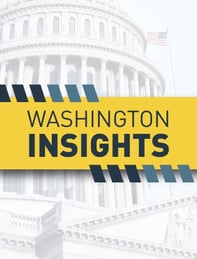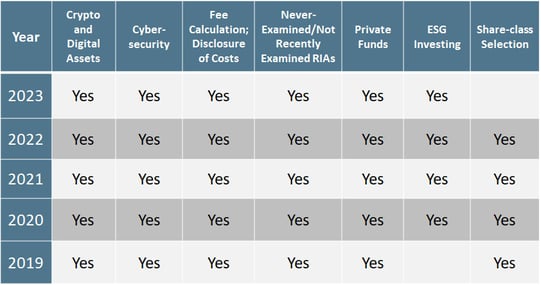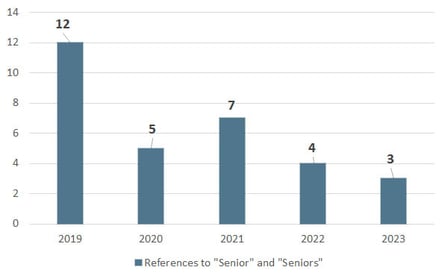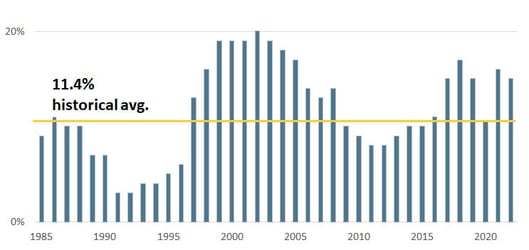
SEC Sheds Share-Class Scrutiny, Shifts Focus to New and Pending Investment Adviser Rules
On February 7, 2023, the SEC’s Division of Examinations released its exam priorities for the year. Given the ever-growing number of priorities announced annually, this time the SEC has organized its top priorities into “Notable New and Significant Focus Areas” in addition to other areas of interest.
In 2023, the 15 percent or so of investment advisory firms that will be subject to surprise inspections can expect greater attention paid to compliance with recently adopted rules (e.g., the Marketing Rule, which went into effect November 4, 2022; and increased reviews of environmental, social, and governance-(ESG) related advisory services, a pending rule). In addition, exam staff will focus its attention on advisors to the rapidly growing number of private funds and what the SEC characterized as the development of “more sophisticated trading and investment strategies” by private fund advisors. Broker–dealers can continue to anticipate special attention paid to compliance with Regulation Best Interest (Reg BI) and Form CRS, both of which went into effect in 2020.
As in past years, many of the Division’s priorities are carried forward. However, over time some of these areas of regulatory focus drop off the priority list while new ones emerge. This column looks first at priorities cited by the agency for 2023 investment advisors and then puts these into context with overall examination trends. Of course, as the 2023 report notes, “the scope of any examination includes analysis of an entity’s history, operations, services, products offered, and other risk factors.”
Below are additional details regarding the principal focus of investment advisor exams.
Retail investors and working families. Examinations will include assessments of advisor (and retail broker) practices regarding recommendations involving alternative investments and managing conflicts of interest in relation to the client’s investment goals and account characteristics. With regard to Reg BI, examiners will pay special attention to investment recommendations of dually registered broker/advisors and their process for making best interest evaluations including consideration of reasonably available alternative investments. With regard to the fiduciary duty for registered investment advisers (RIAs), examiners will review whether conflict-of-interest disclosures are sufficient for the client to provide informed consent to the conflict.
ESG. As it has for the past three years, exam staff will continue to focus on ESG-related advisory services, whether ESG products are appropriately labeled, and “whether recommendations of ESG products are made in the investor’s best interests.” In May 2022, the SEC proposed enhanced disclosures by RIAs and investment companies regarding ESG investment practices. The proposed rule still is pending final adoption.
Cybersecurity. The Division will continue to review cybersecurity issues associated with third-party vendors, the security of third-party products and services, and any unauthorized use of third-party providers. Cybersecurity has been a priority of SEC examiners since 2014. In February 2022, the agency also proposed a rule requiring prompt notification to the SEC by RIAs of significant cybersecurity events.
Emerging technologies and crypto assets. Examinations of emerging technology solutions will be conducted for compliance, marketing, and servicing investor accounts in addition to the offer, sale, and advice on trading in crypto or crypto-related assets and whether the firm met its standard of care under Reg BI for brokers or the fiduciary standard for RIAs.
Other perennial areas of interest by examiners include anti-money laundering (AML), vulnerable senior investors and retirement accounts, complex investments, and variable annuity contracts.
Examination Trends
Many of the Division of Examination’s priorities have remained constant during the past five years (see table 1). The one noticeable difference is in the SEC’s focus on share-class selection, or disclosure of whether a firm charges 12b-1 fees or considers lower-cost shares, which began in 2017 and does not appear on the agency’s radar this year for the first time. With that said, the SEC’s Enforcement Division continues to bring cases against firms for imprudent selection of share classes.
Table 1: SEC Investment Adviser Examination Priorities, 2019–2023*
* Compliance issues related to retail investment advice.
The focus on ESG investing began in 2020 and is likely to continue, given the pending ESG rule for advisors. Although not shown, AML compliance by brokerage firms and mutual funds has been a priority since the SEC first announced its examination priorities in 2013; cybersecurity has been a priority since 2014; and various approaches to compensation arrangements, including wrap-fee programs and performance fees also have appeared as areas of particular interest to examiners over the years.
With the exception of 2022, a focus on retirement accounts has been a recurring examination theme since 2016. Concerns with unsuitable rollover recommendations are listed intermittently in the SEC’s annual examination programs. Rollover advice was first listed as a concern in 2014, a year after a Government Accountability Office’s investigation noted biased advice from firms’ call centers encouraging rollovers to individual retirement accounts (IRAs) from 401(k)-type plans. However, between 2017 and 2020 rollovers were not included on the SEC’s list of priorities. Of course, as noted above, this does not mean the SEC would not take action if examiners discovered problems at a firm.
Vulnerable senior investors. Exploitation of vulnerable senior investors also has been a constant theme of the SEC’s examination program since 2017. However, a count of the number of references each year to “senior” or “seniors” suggests that the SEC’s examiners may be shifting their focus (see figure 1).
Figure 1: SEC Focus on Senior Investors—Word Count
Source: SEC Examination Priorities, 2019–2023  Source: SEC Examination Priorities, 2019–2023
Source: SEC Examination Priorities, 2019–2023
Examination cycle for RIAs. Thirty years ago there were far fewer investment advisory firms, they were dually regulated by state securities regulators, and were relegated to the backwaters of SEC priorities. The sustained, rapid growth of assets—now more than $125 trillion in assets under management (AUM)—along with the corresponding decline in the number of registered brokerage firms and affiliated brokers, has caused a major shift in focus by the SEC during the past two decades.
As shown in figure 2, the inspection cycle for RIAs has ebbed and flowed over the decades. The two major increases in the frequency of examinations occurred first in 1997, when RIAs with less than $25 million in AUM were moved to state oversight, and then again in 2010 when SEC-registered advisory firms with less than $100 million were relegated to state oversight. The pandemic in 2020 also caused a small drop in the number of examined firms. Overall, the SEC has set an unofficial target of 15 percent of firms examined each year, with a special emphasis on new registrants and firms that haven’t received a “visit” in recent years.
Figure 2: SEC Examination Cycle of RIAs, 1985–2022
Source: SEC Annual Reports, Annual Examination Priorities
In summary, the SEC continues to have an active outreach program, conducting hundreds of compliance outreach events each year with investors, the securities industry, and other securities regulators. It also published seven risk alerts in 2022 in which examiners noticed real or potential compliance issues including digital assets, identity theft, the new adviser marketing rule, adviser fee calculations, and deficiencies noted in Reg BI exams of broker–dealers. In its fiscal year 2023 budget, the SEC requested 90 new positions for the Division of Examinations “to keep pace with industry growth,” a nearly 10-percent increase in total exam staff. It is unknown at this time how many of those positions were approved.
THE WRAP-UP
SEC Regulation
SEC proposes adding crypto assets to Advisor Custody Rule. On February 15, the SEC proposed rule changes to “enhance protections of customer assets managed by registered investment advisers,” according to an agency news release. The rule would cast a wider net “to apply to all assets, not just funds or securities,” including crypto assets, SEC Chair Gary Gensler said.
The 434-page proposed rule would continue to entrust client assets of investment advisors to qualified custodians, such as certain banks or broker–dealers, and retains a longstanding requirement that RIAs holding direct custody are subject to a surprise examination by an independent public accountant. The vote on issuing the rule for public comment was 4–1, with Republican Commissioner Hester Pierce dissenting. Pierce expressed several concerns, including the premise that crypto assets are securities.
SEC to shorten settlement cycle to one day. The SEC on February 15 formally adopted a rule change to shorten the standard settlement cycle for most broker-dealer transactions from two business days after the trade date to one business day.
The rule also requires RIAs to keep records for securities transactions although the adopting release clarifies that an advisor may rely on a third party to make and keep the required records for allocations, confirmations, and affirmations. However, the release noted that the rule “does not reduce an adviser’s obligations under Rule 204-2 [i.e., the so-called ‘Books and Records rule’].” The SEC estimates 70 percent of trading records are maintained by custodians. The rule takes effect May 28, 2024. The two Republican commissioners objected, stating their preferred compliance deadline was immediately after the 2024 Labor Day holiday.
Fund companies push back on proposed “swing-pricing” rule. Bloomberg Law reports that major fund companies are pressing the SEC to reconsider a rule proposed in November 2022 to overhaul how mutual fund shares are adjusted during significant shareholder redemptions. Experts say the rule change would benefit investors with long-term buy-and-hold strategies from bearing the costs of outflows such as the liquidity crisis in March 2020.
According to the report, BlackRock, Fidelity, Schwab, Morgan Stanley, and other investment firms argue that the new rule would result in a significant decline in use of mutual funds by individual investors and “reshape the fund landscape, harming tens of millions of investors,” said Rick Wurster, president of Charles Schwab Corporation. The rule would adjust a fund’s net asset value by a certain amount once redemptions or purchases exceed a certain threshold.
SEC Enforcement
SEC charges NBA Hall of Famer Paul Pierce with illegal touting of crypto tokens. NBA Hall of Famer Paul Pierce is the latest celebrity to be charged by the SEC with failure to disclose payments received for promoting crypto asset securities, according to a February 17 news release by the agency. Pierce allegedly touted EMAX tokens, a crypto security sold by EthereumMax, on Twitter and was paid more than $244,000 in the currency.
In addition to paying about $240,000 in disgorgement and interest, Pierce also agreed to pay a
$1.115-million fine. In October 2022, television celebrity Kim Kardashian was fined $1.26 million in penalties, disgorgement, and interest for being paid $250,000 to publish a post on her Instagram account promoting EMAX tokens.
Church of Latter-day Saints, investment manager, charged with disclosure failures. A nonprofit entity operated by the Church of Jesus Christ of Latter-day Saints and its investment management firm, Ensign Peak Advisers Inc., were charged on February 21 with failure to file forms disclosing the Church’s equity investments, instead filing forms for shell companies that the SEC said, “obscured the Church’s portfolio.” According to the SEC, Ensign Peak failed to file Forms 13F in which investment managers are required to disclose the value of securities they manage. Ensign Peak agreed to pay a $4-million penalty and the Church a $1-million penalty.
Stifel joins other brokerage firms, hedge funds in SEC WhatsApp probe. Stifel Financial Corporation, an independent broker–dealer, has joined other securities firms in the SEC’s ongoing WhatsApp probe in which firm employees have allegedly used unapproved messaging apps for business communications. Stifel reported the SEC investigation in its latest annual 10-K filing. Stifel is just the latest firm that is part of an industrywide sweep by the SEC and the Commodity Futures Trading Commission that has resulted in more than $2 billion in fines, according to Bloomberg Law.
The list has grown since last fall when the SEC announced “widespread recordkeeping failures” and substantial financial penalties among 16 Wall Street firms including UBS, Goldman Sachs, JPMorgan Chase, Citigroup, and others.
Reg BI Enforcement
Fines mount against brokerage firms for Reg BI violations. Cases against brokerage firms with sloppy compliance systems are starting to pile up, including fines since Reg BI went into effect on June 30, 2020, according to a review by Potomac Strategies LLC. To date the Financial Industry Regulatory Authority has fined three brokerage firms for various infractions, including failure to set up supervisory systems designed to reasonably comply with Reg BI; recommending excessive trades in a senior customer’s account; unsuitable trades in other customer accounts; and in one instance, churning violations when a broker recommended more than 350 trades in one customer’s account, resulting in payment of more than $54,000 in commissions and investment losses of more than $17,500 during the same 17-month period.
The SEC’s first case was brought under Reg BI against a brokerage firm in June 2022, when five of the firm’s brokers allegedly sold $13.3 million in high-risk and unrated bonds known as L bonds to retirees and other retail customers.
ESG
GOP presses SEC’s Gensler for climate change rule documents. In a February 22 letter to SEC Chair Gensler, senior GOP leaders in the House and Senate requested numerous documents justifying the agency’s proposed rule requiring public companies to disclose additional information on carbon emissions. Signed by Rep. Patrick McHenry (R-NC), chair of the House Financial Services Committee; Rep. Bill Huizenga (R-MI); and Senator Tim Scott (R-SC), ranking member of the Senate Banking Committee, the letter called the pending rule an “abuse of the rulemaking process, and blatant partisan efforts to circumvent the legislative process.”
The legislators requested the information and responses by the agency to detailed questions by
March 8, 2023.
Investment Resources
Edward Jones survey finds many Americans lack emergency savings. Congressional legislation known as SECURE Act 2.0 couldn’t have come at a better time. According to a recent survey by independent broker–dealer Edward Jones, nearly one-third of all Americans (29 percent) have less than $500 in their emergency savings fund.
Experts recommend that households have three to six months of living expenses in an emergency savings fund; however, 37 percent expect their savings to last no more than one month, and 38 percent consider their emergency savings fully funded. The SECURE Act 2.0 creates several different ways to make access to retirement savings or a “sidecar” account more readily accessible to workers.
Report shows most 529 plans lose money to taxes, fees. Findings from a working paper by the National Bureau of Economic Research suggest 60 percent of 529 college savings accounts yield an expected loss of 9 percent over the accounts’ projected time horizons. According to the authors, the losses are due to higher expenses and “suboptimal saving and investment behavior.”
The study did not limit its focus to investors in their home state 529 plan and defined “optimal” plans as plans in which a household can earn a higher expected payoff. The paper identified 22 states that were defined as having “optimal” plans and 28 with “suboptimal” home-state plans. The state plans are listed on pages 32–33 of the study.
Fidelity: Average 401(k) balance lost 20 percent last year. The average 401(k) account at Fidelity Investments lost about a fifth of its value last year, according to a report by Fidelity released on February 23. Although various retirement account balances, including IRAs, increased at year’s end, all were down significantly from Q4 2021. The average 401(k) balance of $135,600 dropped to $103,900 in Q4 2022. The average IRA account balance dropped 20 percent year-over-year to $104,000. The total savings rate for baby boomers was the highest among the generations, at 16.5 percent in 2022.
ABOUT WASHINGTON INSIGHTS
The purpose of this column, prepared by Potomac Strategies for Investments & Wealth Institute, is to give members legislative, regulatory, and other public policy news and analysis. It is strictly informational and should not be relied upon as legal or compliance advice. Investments & Wealth Institute, as an education and credentialing organization, does not lobby Congress and generally does not advocate for any particular legislative or regulatory position either on its own or through its relationship with Potomac Strategies.
If you have questions after reading this update, please contact the Institute’s general counsel,
Robert (Rob) Frankel at rfrankel@i-w.org.



